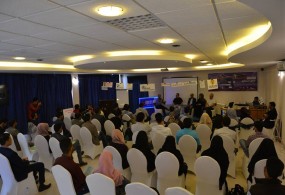
RECO Co-Organize Yemen Hackathon for Tech. Startups
- Saturday, 07 April, 2018
- https://al-tagheer.com/news100431.html
The Hackathon, which Co-Organized in Sana’a by Resilient Communities Organization (RECO), for Entrepreneur and Startup Companies in Technology sector in Yemen called on young entrepreneurs and emerging companies to reformulate the goals of their companies in line with the needs of society at the present time and the requirements of the market, considering emerging companies are the best solution to provide job opportunities for young people and eliminate unemployment in all countries.
The Hackathon called on local organizations to allocate part of their savings to support emerging projects in a way that serves the growth of these companies and helps in the sustainability of local organizations.
Young entrepreneurs called for the need to enhance their skills in mobilizing resources to access external financing opportunities, which Yemen is one of the countries targeted for its financing, and the participants also called for a legal framework to officially register emerging companies in an easy way in a manner that preserves their rights in the future in the ownership of these companies and helps them to enter into partnerships External optimally.
The Hackathon advised Yemeni investors at homeland and abroad to establish investment portfolios with venture capital to invest in emerging companies that have reached the stage of growth and expansion according to modern international frameworks.
The Hackathon called for local and international microfinance funds and programs to adopt a financing strategy for emerging companies as an important future tributary of the national economy and a real transition towards the fourth industrial revolution.
The aim of the Hackathon, which was organized by the National Foundation for Development and Humanitarian Response, Find Up Forum, Resilient Communities Organization (RECO), Block One Business Incubator, Tire Company, Mocha Hunters and I-Shobak aims to bring together Yemeni programmers and young investors in the field of technology to find a solution to the problem of investment in this field and find opportunities to finance these companies.
The expanded Hackathon was held today in Sana'a for entrepreneurs and start-ups, "Hackathon for Emerging Projects", which included more than fifty youth companies working in the technical field and entrepreneurs.
In the morning sessions, Dr. Adel Abdullah Salah, one of the founders of a startup in Yemen, reviewed a working paper entitled "Fundamentals of Resource Mobilization for Startups - What I Learned in Silicon Valley".
In it, he talks about the success factors of the project and the most mistakes that entrepreneurs make.
After that, Salah presented the experience of his visit to Silicon Valley in the United States of America and the experience of establishing the emerging company iContact for the young American Ryan Ellis in the management of the company and the stages of mobilizing financing depending on the economic units that focus on calculating the average value of the customer’s life and the cost of bringing the customer to companies that have the potential to spread in Global markets.
Engineer Fadi Al-Asoudi also reviewed a working paper entitled "Technology and Problems Facing Emerging Businesses." In which he identified the most important points that entrepreneurs must take into account in the stages of forming the company’s growth, the most important of which is determining the identity of the company and the appropriate time for choosing projects, ideas and appropriate cost for projects and appropriate payment methods for hosting and sites, the need for the idea to be creative and creative, as well as the importance of keeping pace with technological development and including It solves the problem and needs of the consuming category.
In the second morning session, an open discussion session was held with the participants, moderated by Adeeb Qassem, an entrepreneur and founder of a number of startups, in which he participated to present the experiences of challenges and opportunities for startups in Yemen, Dr. Sharaf Al-Kibsi, CEO of the National Microfinance Corporation, Iman Al-Maqtari, a business pioneer and founder of e-Shbak, and Hussein Ahmed, founder of the Moka Hunters and Dr. Adel Salah, founder of Portal 365, talked about the opportunities and challenges for establishing startups, optimal financing methods, and their companies' experiences in the field of financing and mobilizing financing for small startups.
The interlocutors answered the questions of the participants in the Hackathon, the most important of which is how startups overcome the great challenges they face in the first stage of incorporation, appropriate financing opportunities, legal problems in registering for emerging companies in Yemen and the lack of harmonization of Yemeni laws with their counterparts in the world, which is a real obstacle. To establish new companies, especially emerging ones.
During the conclusion of the morning session, successful experiences were presented by Yemeni entrepreneurs to mobilize resources for their companies and expand their businesses outside of Yemen, and they are the young investor in the emerging business, Hussein Ahmed, founder of Moka Hunters in Yemen and America, and two other experiences by recording two films of two Yemeni youth whose businesses have moved abroad. They are Imad Al-Masoudi, founder of AqarMap Company in Saudi Arabia and Egypt, and a young man, Basem Al-Warafi, founder of the Qout Kak Company in the Sultanate of Oman.
In the evening session of the Hackathon, the participants were divided into three workshops that discussed three main axes: mobilizing resources for startups managed by Dr. Adel Salah and Ali Sharwan, electronic marketing Iman Al-Maqtari, programming and technology problems Fadi Al-Aswadi.
https://www.facebook.com/SERAJSANAA1/videos/612797615734992



